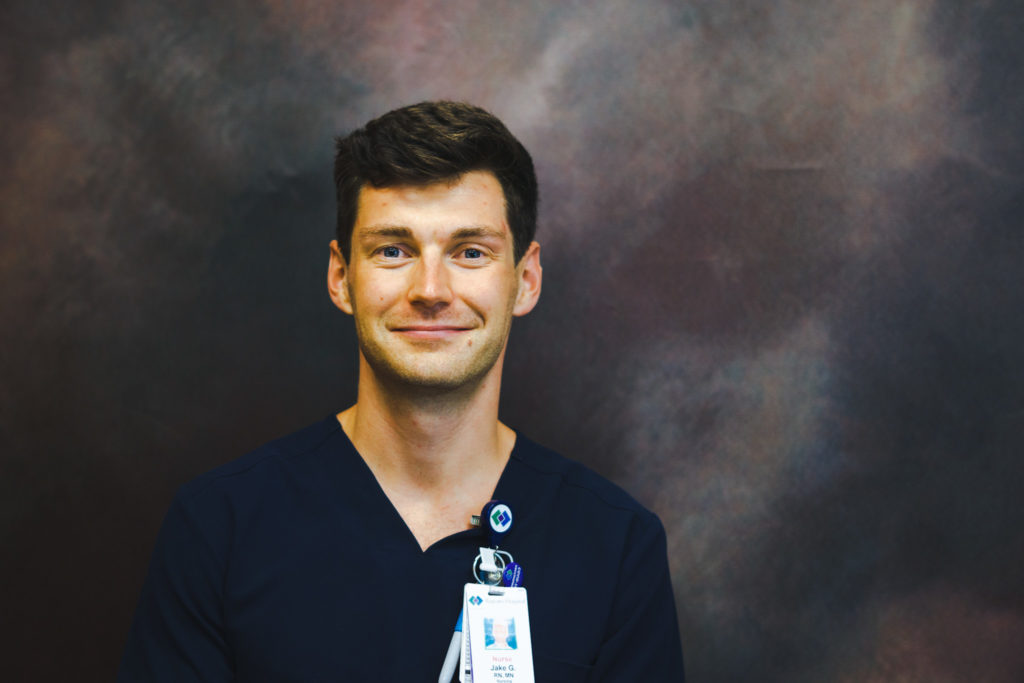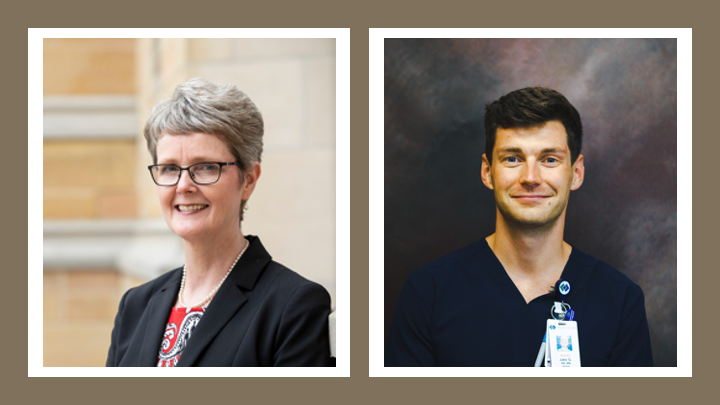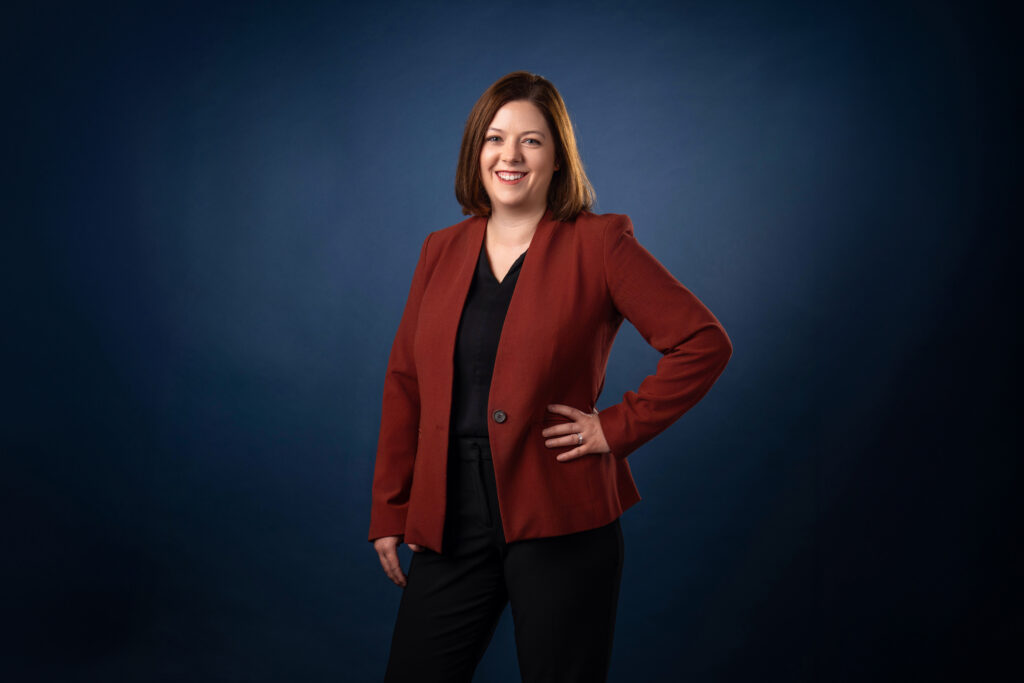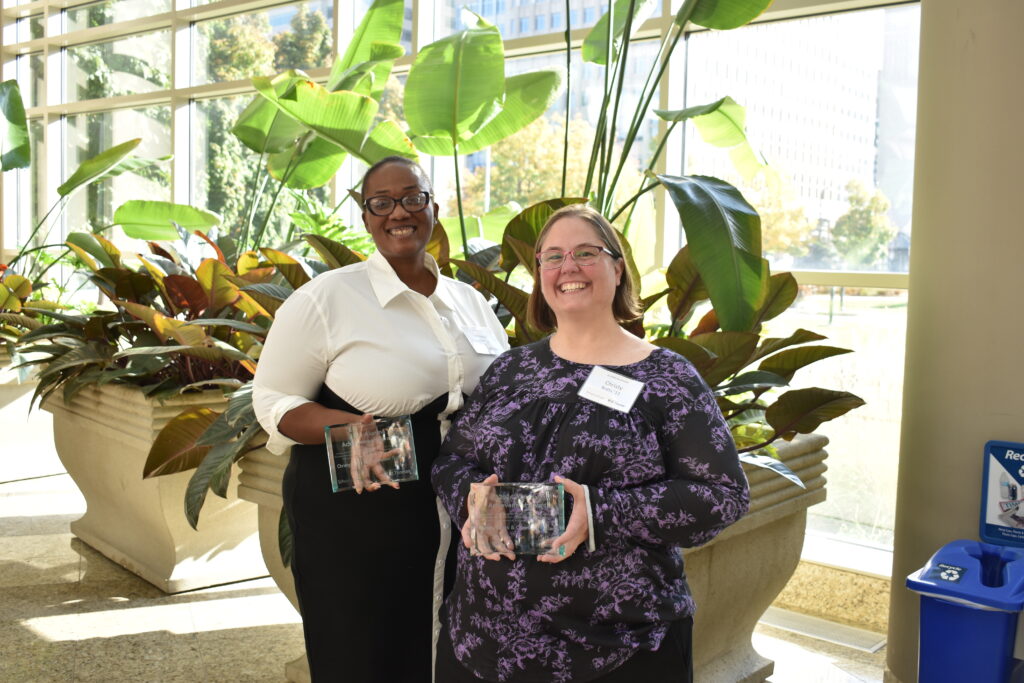Martha Scheckel, director of the St. Thomas School of Nursing, recently sat down with Jake Gerhartz, RN, PHN, MN, who graduated from St. Thomas with a degree in exercise science from the Department of Health and Exercise Science. Scheckel and Gerhartz, now a registered nurse at Regions Hospital, discussed the nursing shortage, nursing during a pandemic, managing stress and burnout, and why there’s so much to love about being a nurse.
The conversation has been edited for length and clarity.

Martha Scheckel: To start, how has the national nursing shortage affected your experience as a nurse?
Jake Gerhartz: Before the pandemic, I never really noticed it. As an inpatient nurse, we often have more staff available because a lot of new grads want to come right into that. But now with the pandemic, we're just constantly trying to figure out how we are going to staff when there’s an incredibly high need for hospital beds.
There are a lot of complex challenges that come with a pandemic, like temporarily creating additional beds to help manage capacity over what we normally provide. Working under such prolonged stress is also emotionally fatiguing for staff. That’s also a challenge, as there are some feelings of burnout and what can come with that – like staff calling in sick. These factors interact and present obstacles that must be managed the best we can.
Martha: What are some steps staff take to alleviate that problem?
Jake: We have a float pool, but what if we need more staff than the float pool has to offer? We can do different things in those moments like surge staffing, where we have higher patient loads, or the charge nurse also takes patients when they normally wouldn't. But this can increase anxiety around workloads. So, at times we’ve also adapted our “typical” daily workload – such as reducing some of the more time-consuming, non-patient-facing tasks – so we can be spending more time at the bedside to ensure we’re still providing safe and effective care.
It’s important to have relentless support in your work culture. I think that's something that has really helped us get through all of this. Today might be wild, but we've got each other's backs, and that helps alleviate some of that stress. I also think people have been more willing to show moments of gratitude and appreciation. It's nice to know that even though it might feel chaotic, we have the support we need now.
Martha: I love what you said about relentless support. Can you tell me a typical day now and share some examples of relentless support on a shift? Also, what did we take for granted pre-pandemic that we should have always been doing?
Jake: For example, yesterday, I came in and we were short nurses. When I’m on a day shift, I can have a max of four patients a day. When we’re not short, if they know that the patients I have require more care, they might only give me three to make it less stressful. But that's not an option when we're short.
Sometimes what another nurse needs is as simple as taking a patient who’s getting restless on a quick walk. Many nurses want to do everything ourselves. But sometimes we need to accept support from other people and delegate some of our tasks. Nurses offer help knowing it could potentially affect things like when they go to break, or when they get out at the end of the day, but they are still willing to do it.
Support means a lot to people right now, and it’s something that pre-pandemic we took for granted. We acknowledged that we have a good, supportive culture on our unit, but I think the pandemic has really made us so much more appreciative of each other.

Martha: I remember toward the end of the shift as a young nurse, there were moments when I felt like I needed help, but I also worried because it would put someone else behind. But what you're saying about small acts is huge. And then you think about what it meant to that patient to go on a walk. That was meaningful to that patient. We forget sometimes about delegation and drawing on the strengths and support of one another. What else do you think can be done?
Jake: It’s doing what we can in those moments, but also thinking about structural change. We need to change how we talk about nursing. For example, being more willing to collaborate with one another makes us more efficient and helps us not be exhausted at the end of every day. Nurses are humans, and we still need to do human things. It's OK to take five minutes for yourself. We also need to ask for accountability from our leaders. I think about our mission and values in any organization, and we must ask if we are living those things out in how we treat our patients but also in how we treat our staff. It’s important to promote a culture that is OK with speaking up. I've been lucky to feel I can do that.
Martha: Teamwork and collaboration are linked strongly to quality and safety. Here, at the School of Nursing, we’ll be teaching students that quality and safety require teamwork and collaboration, so the patient doesn't get hurt, and why it’s important for the safety of the nurse as well. So how do we change? You need to be taking care of yourself as well. We shouldn't stigmatize self-care.
Jake: Yes. I was thinking about self-advocacy and burnout. We are relentless, but we’re not invincible. There was an article that comes to mind from July 2020 from the Indian Journal of Medical Ethics. One of the things they talked about was how nurses must realize they are taking on increased stress levels right now. You take care of your body; why is it any different to say we should take care of our minds? We're holistic beings. We need to make sure we're nurturing our mental, emotional, social, spiritual and physical health, especially during times of stress.
Martha: Three years in is when we lose a lot of nurses from the profession. You're now four years in: What’s kept you going?
Jake: I’ve had tough days, but I try to acknowledge that it was just one tough day. I feel lucky that when I leave work at the end of the day, I can't do anything work-related. I'm thankful that I'm forced to leave work at work.
I'm very much still passionate about nursing. As tired as I am, I've never loved what I do more than right now. Part of that comes from all the support I have at work, all my wonderful colleagues, and knowing that we're going through this together. It’s also taking time to find moments of joy in my work. Occasionally, we have experiences with patients I like to call “lights.” They just exude joy and positivity. They could have the worst thing going on, but they give so much, and they don't even realize how much they're helping. It’s important to make sure I'm not letting those moments slip away. I go home and reflect, take time to be grateful – and it helps me realize why I love what I do.
Martha: Yes. Nursing offers professional growth and development and the opportunities to do so many different things. The diversity of experiences keeps me energized, as well as the fact that I can contribute to many different venues. I've been a hospital nurse, a home care nurse, a hospice nurse, a school nurse. I've been in academics and academic leadership.
We really want to teach students how to discover their passion, how to rejuvenate, how to renew all the time. Because sometimes you think you have a passion for one thing but discover you’re passionate about something entirely different.
Jake: Yes. Growing up, I knew I wanted to work in health care, but I didn't know in what capacity. I did exercise science as an undergrad and then during that time realized physical therapy is not what I wanted to do and found a program for post-undergrads to do nursing, just like your new MSN. When you're starting a bachelor’s degree you tend to look at all the positives of a profession, but don’t consider the challenges until later. It would be more helpful to help people be fully aware and then decide: Do I want to do this or not?
Martha: It’s thinking about early interventions we can do to help students move through that discernment process. There’s a lot of different ways we can incorporate that into an academic setting to help nurses find their passion.







